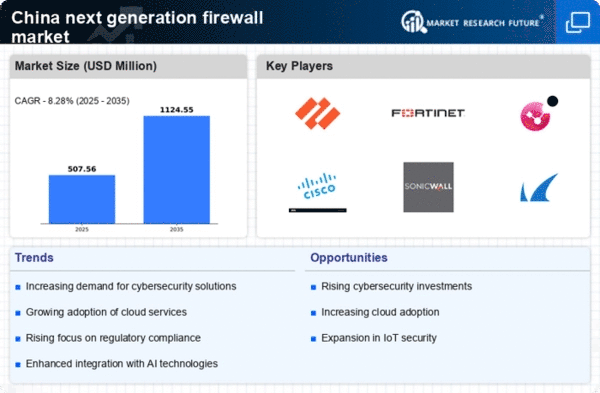Integration of IoT Devices
The proliferation of Internet of Things (IoT) devices in China presents both opportunities and challenges for the next generation-firewall market. As more devices connect to networks, the attack surface expands, making organizations vulnerable to cyber threats. Next generation-firewalls are increasingly being designed to manage and secure IoT environments, providing essential protection against unauthorized access and data breaches. The market is likely to see a surge in demand for solutions that can effectively monitor and control IoT traffic. With estimates suggesting that the number of connected IoT devices in China could exceed 1 billion by 2025, the need for advanced security measures becomes critical. This trend indicates a growing recognition of the importance of integrating next generation-firewalls into IoT security strategies.
Rising Cyber Threat Landscape
The escalating cyber threat landscape in China is a primary driver for the next generation-firewall market. With increasing incidents of data breaches and cyberattacks, organizations are compelled to adopt advanced security measures. Reports indicate that cybercrime costs in China could reach $1 trillion by 2025, highlighting the urgency for robust cybersecurity solutions. The next generation-firewall market is positioned to address these challenges by offering enhanced threat detection and prevention capabilities. As businesses recognize the need to protect sensitive data and maintain customer trust, investments in next generation-firewall technologies are likely to surge. This trend is further supported by the growing awareness of the financial and reputational risks associated with inadequate cybersecurity measures, prompting organizations to prioritize their security infrastructure.
Increased Focus on Data Privacy
The heightened focus on data privacy in China is a crucial driver for the next generation-firewall market. With the implementation of stricter data protection regulations, organizations are under pressure to ensure compliance and safeguard personal information. The next generation-firewall market is likely to experience growth as businesses seek solutions that not only protect against cyber threats but also ensure data privacy. As consumers become more aware of their rights regarding personal data, companies are compelled to adopt technologies that enhance their security posture. This trend is further supported by the increasing number of data breaches, which have raised public concern over data security. Consequently, organizations are investing in next generation-firewalls to mitigate risks and demonstrate their commitment to protecting customer data.
Government Initiatives and Support
Government initiatives aimed at bolstering cybersecurity in China significantly influence the next generation-firewall market. The Chinese government has implemented various policies and regulations to enhance national cybersecurity, including the Cybersecurity Law and the National Cybersecurity Strategy. These initiatives encourage organizations to invest in advanced security technologies, including next generation-firewalls, to comply with regulatory requirements. Furthermore, the government is likely to provide financial incentives and support for businesses adopting these technologies, fostering a conducive environment for market growth. As organizations strive to align with government mandates, the demand for next generation-firewall solutions is expected to rise, driving innovation and competition within the market.
Digital Transformation and Remote Work
The ongoing digital transformation across various sectors in China is a significant driver for the next generation-firewall market. As organizations increasingly adopt digital tools and remote work practices, the need for secure network environments becomes paramount. The shift towards cloud-based services and remote access solutions has created new vulnerabilities, necessitating advanced security measures. The next generation-firewall market is poised to benefit from this trend, as businesses seek to safeguard their networks against potential threats. According to industry estimates, the remote work segment is projected to grow by 30% annually, further amplifying the demand for robust cybersecurity solutions. This transformation underscores the importance of integrating next generation-firewalls into organizational security frameworks to ensure data integrity and confidentiality.
















